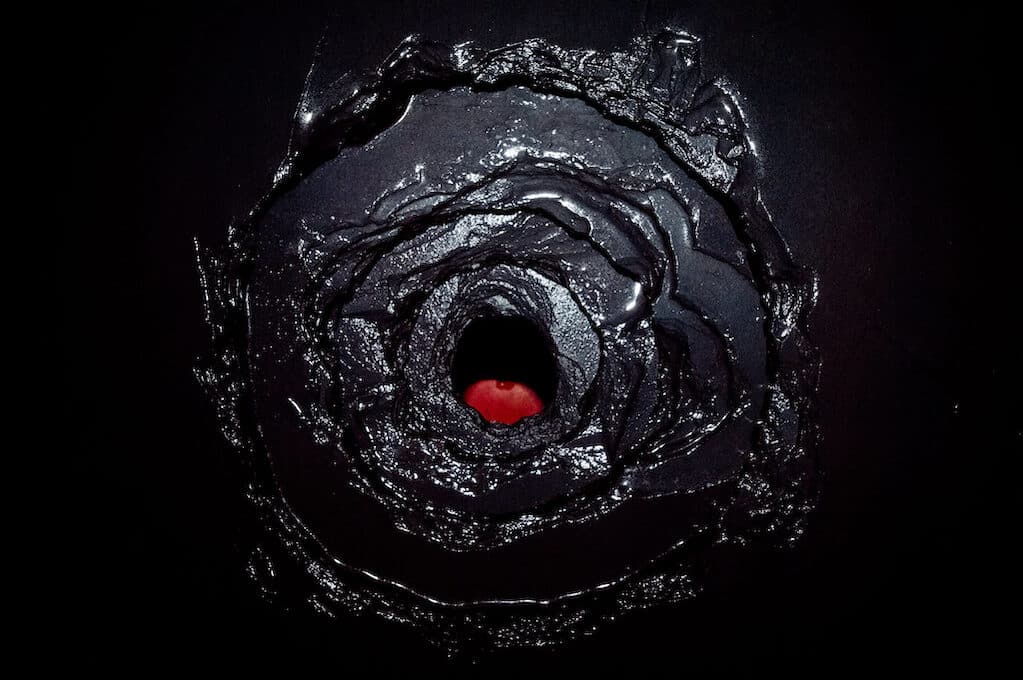On her twenty-fourth birthday, Mia visits a local ceramics studio and paints a small bowl black, gray, and red. She has been reading about dreams and the ways they manifest. She is contemplating the power of purposeful thought. She feels the need to create a reminder, a visible monument, an outward cradle for dreams. No, not a cradle. That implies too much completion. It needs to be a womb, a place where things gestate. That is why the inside is blood-and-guts red.
So many of her friends have already had children. Lana’s on her second. Sarah’s on her third. Mia does not want them, the flesh-and-blood children. But she does want her dreams. She does want them birthed. So she sponges black paint on the layer of gray. Black for severity. Black for I Mean It. Red for gestation, for fire, for life.
At home, she writes dreams on thin-cut strips of paper. Red, of course, because only red can mirror the visions in her chest. Red is for her deepest troves, their surging din of life. Red is for the urgency that animates her art. When the bowl has been glazed, she drops the dreams inside, one after the next, a lonely fertilization. They nestle, potent zygotes with only one parent. She folds them in half because they are secret. No one knows them but her. She does not burn incense—she is not that cliché—but she feels the gravity of the ritual she has composed. This is the dream bowl. The external womb.
Her plan is quite simple. When a dream is accomplished, she will pull out the paper, crinkle it up, and throw it away. There will be no more need for a small folded symbol since the unfolded dream will be free in the world. Eventually, she thinks, the womb will be empty, having borne many beautiful things.
In the future, Mia will find herself living with a man named Robert. Robert will be kind. He will treat Mia well. The two will be happy on a block lined with trees. One day she will enter her beautiful home to find the womb filled with cilantro and parsley, placed on the table among other cut-up herbs. She will inhale sharply and Robert will glance up from the pepper he is chopping on the plastic cutting board. Is something wrong? he will ask. He will follow the line of her gaze to the bowl. I pulled it out of a box, he will say. They will still be unpacking. Is it special? I didn’t know.
Mia will resemble a creature torn from water, eyes and mouth flapping but no words coming out. No, she will say. She will smile like a dead fish. No, she’ll repeat. It’s fine. That’s what it’s for. She will kiss Robert’s cheek and thank him for prepping the colorful array of summer vegetables. They will have a young couple over for supper and enjoy the evening breeze on the backyard’s wooden porch. The couple will complement Robert’s good cooking and Mia’s fine choice of wine. The bowl of cilantro will pass between hands, yielding flavor to food.
Mia will struggle to be all right with the false innocence of the bowl. She will be startled by the measure of her own relief; the bowl had become an enemy over time. When was she ever going to illustrate a webcomic or apply for an MFA? The dreams will have sat on their red scraps of paper, jeering at her, she will think, from the womb. They will have gathered dust that will muffle their taunts, but still the black bowl will have frowned with severity, red innards glistening like freshly killed meat. The dream-slips will have fallen out during the move. They will lie at the bottom of an unmarked cardboard box, next to inked sketches, rulers, and markers, other stillborn implements of what might have been.
Mia will try to take comfort in their absence. She will try to appreciate the functionality of the bowl. She will smirk at the vaguely communist undertones of the whole affair—the intelligentsia bowl with its smooth, unscarred fingers banished to the farmland to root for its keep. The bowl will carry weight now. Not lofty dreams.
The bowl will endure its first run in the dishwasher. It will sit with the spatulas and cracked-from-use plates. When Mia arises, groggy and yawning, and shuffles to the kitchen to unload the machine, she will turn the bowl over in her smooth, unscarred hands. She will set it in the cupboard, away from the everydays, back in a corner, but below the once-a-years. She will contemplate the venom of utility and beauty, contemplate the sacrifice of symbols gone awry. She will contemplate the weight of what is carried in a womb bowl, the ruthless birth process, and the burden of regret.
Eventually, she will close the cupboard, pick up a pencil, and draw.
_
Catherine Bailey is currently a student in Western Michigan University’s English Ph.D. program. Her poetry, prose poetry, and fiction have appeared or are forthcoming in Superstition Review, Pomona Valley Review, Poetry South, Line Zero, Between the Lines, Scythe, Lingerpost, Rose Red Review, Broad!: A Gentlelady’s Magazine, Handful of Dust, Magic Lantern Review, Femspec, the anthologies Involution (Pink Fish Press, 2013) and Her Own Worst Enemy (Kendall Hunt Publishing, 2014), and other publications. She has also published articles and reviews in Colloquy: Text Theory Critique, Yes! Magazine, Afterimage: The Journal of Media Arts and Cultural Criticism, Worldchanging, The Hilltop Review, and Three Percent.
Lead image: “dark descent 2” (via Flickr user seth m)

